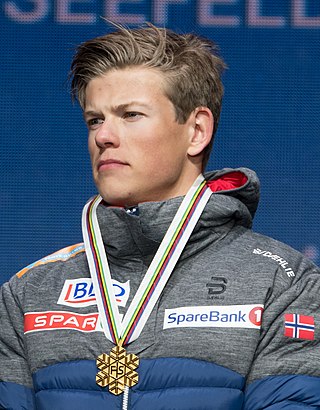
Jean-Baptiste Grange is a French retired World Cup alpine ski racer. He competed primarily in slalom and earlier also in giant slalom and combined.

Manfred Mölgg is an Italian former World Cup alpine ski racer. He specialized in the technical events of slalom and giant slalom.

Anna Veith is an Austrian former alpine ski racer and Olympic gold medalist. She was the overall World Cup champion for the 2014 and 2015 seasons.

Marie-Michèle Gagnon is a World Cup alpine ski racer from Canada. Born in Lévis, Quebec, she was a technical skier focused on slalom. However, since an injury at the start of 2017 season, she no longer competes in slalom and rarely in giant slalom, focusing on speed disciplines and combined.
Erin Mielzynski is a Canadian former World Cup alpine ski racer. She primarily competed in technical events and specialized in slalom.

The 45th World Cup season began on 23 October 2010, in Sölden, Austria, and concluded on 20 March 2011, at the World Cup finals in Lenzerheide, Switzerland.
The 1986–87 FIS Cross-Country World Cup was the 6th official World Cup season in cross-country skiing for men and women. The World Cup started in Ramsau, Austria, on 10 December 1986 and finished in Oslo, Norway, on 15 March 1987. Torgny Mogren of Sweden won the overall men's cup and Marjo Matikainen of Finland won the women's.
The 1988–89 FIS Cross-Country World Cup was the 8th official World Cup season in cross-country skiing for men and women. The Women's World Cup started in La Clusaz, France, on 10 December 1988 and finished in Falun, Sweden, on 12 March 1989. The Men's World Cup started in Ramsau, Austria on 10 December 1988 and finished in Falun, Sweden, on 12 March 1989.Gunde Svan of Sweden won the overall men's cup, his fifth title, and Yelena Välbe of the Soviet Union won the women's cup.
Para-alpine skiing classification is the classification system for para-alpine skiing designed to ensure fair competition between alpine skiers with different types of disabilities. The classifications are grouped into three general disability types: standing, blind and sitting. Classification governance is handled by International Paralympic Committee Alpine Skiing. Prior to that, several sport governing bodies dealt with classification including the International Sports Organization for the Disabled (ISOD), International Stoke Mandeville Games Federation (ISMWSF), International Blind Sports Federation (IBSA) and Cerebral Palsy International Sports and Recreation Association (CP-ISRA). Some classification systems are governed by bodies other than International Paralympic Committee Alpine Skiing, such as the Special Olympics. The sport is open to all competitors with a visual or physical disability. It is not open to people with intellectual disabilities.

Wendy Holdener is a Swiss World Cup alpine ski racer who specialises in slalom and combined. She is a two-time World champion in combined and a five-time Olympic medalist, four individual with one gold medal in the team event at Pyeongchang in 2018. Four years later in 2022, she won a silver medal in the combined.

Marco Odermatt is a Swiss World Cup alpine ski racer who races in giant slalom, super-G and downhill. He is considered one of the best alpine ski racers of his generation. In addition to the World Cup, Odermatt has competed for Switzerland at two Junior World Championships, three World Championships, and the 2022 Winter Olympics.

Johannes Høsflot Klæbo is a Norwegian cross-country skier who represents Byåsen IL. He holds multiple records, most notably for being the youngest male in history to win the FIS Cross-Country World Cup, the Tour de Ski, a World Championship event, and an Olympic event in cross-country skiing.
Riikka Honkanen is a Finnish alpine ski racer.
The 2020–21 FIS Cross-Country World Cup was the 40th official World Cup season in cross-country skiing for men and women.

The 2020–21 FIS Ski Jumping World Cup was the 42nd World Cup season in ski jumping for men, the 24th official World Cup season in ski flying, and the 10th World Cup season for women. The men's season started in November 2020 in Wisła and ended in March 2021 in Planica. The women's season started in December 2020 in Ramsau and ended in Chaykovsky.

The International Ski Federation (FIS) Alpine Ski World Cup was the premier circuit for alpine skiing competition. The inaugural season launched in January 1967, and the 2020–21 season marked the 55th consecutive year for the FIS World Cup. As it had every year since 2006, the season began in Sölden, Austria in October, and it ended with the World Cup finals in March, which were held in Lenzerheide, Switzerland. However, the COVID-19 pandemic forced many changes to the original racing schedule. Among them were the following:

The men's slalom in the 2021 FIS Alpine Skiing World Cup involved 11 events including the final, exactly as scheduled without any cancellations.
The 2021–22 FIS Ski Jumping World Cup was the 43rd World Cup season in ski jumping for men, the 25th official World Cup season in ski flying, and the 11th World Cup season for women. The men's season started in November 2021 in Nizhny Tagil, Russia and concluded in March 2022 in Planica, Slovenia. The women's season started in December 2021 in Lillehammer, Norway and was expected to conclude in March 2022 in Chaykovsky, Russia. However, because of the Russian invasion of Ukraine, the women's season concluded in Oberhof, Germany.
The 2021–22 FIS Cross-Country World Cup was the 41st official World Cup season in cross-country skiing for men and women.

The International Ski Federation (FIS) Alpine Ski World Cup was the premier circuit for alpine skiing competition. The inaugural season launched in January 1967, and the 2021–22 season marked the 56th consecutive year for the FIS World Cup.











